An Investigation into TQM Impact on the UK Construction Industry
VerifiedAdded on 2022/08/15
|37
|10754
|11
Project
AI Summary
This research proposal delves into the relationship between Total Quality Management (TQM) and the construction industry, specifically focusing on the UK context. The proposal aims to investigate the impact of TQM on the UK construction sector, examining its relevance, potential risk factors, and the benefits it offers. The study will explore the concept of TQM, its relevance in the service industry, and its impact on the construction industry. The methodology includes the research philosophy, approach, design, data collection methods, sampling techniques, and ethical considerations. The proposal also outlines the research limitations and the proposed time frame. The research seeks to understand how TQM can improve project outcomes, employee relations, and overall organizational performance within the competitive UK construction market, while also acknowledging the challenges of implementing TQM in the industry. The research will employ a case study approach to provide in-depth insights into the practical application and effects of TQM.

Running Head: RESEARCH PROPOSAL
RESEARCH PROPOSAL
Name of the Student:
Name of University:
Author Note:
RESEARCH PROPOSAL
Name of the Student:
Name of University:
Author Note:
Paraphrase This Document
Need a fresh take? Get an instant paraphrase of this document with our AI Paraphraser
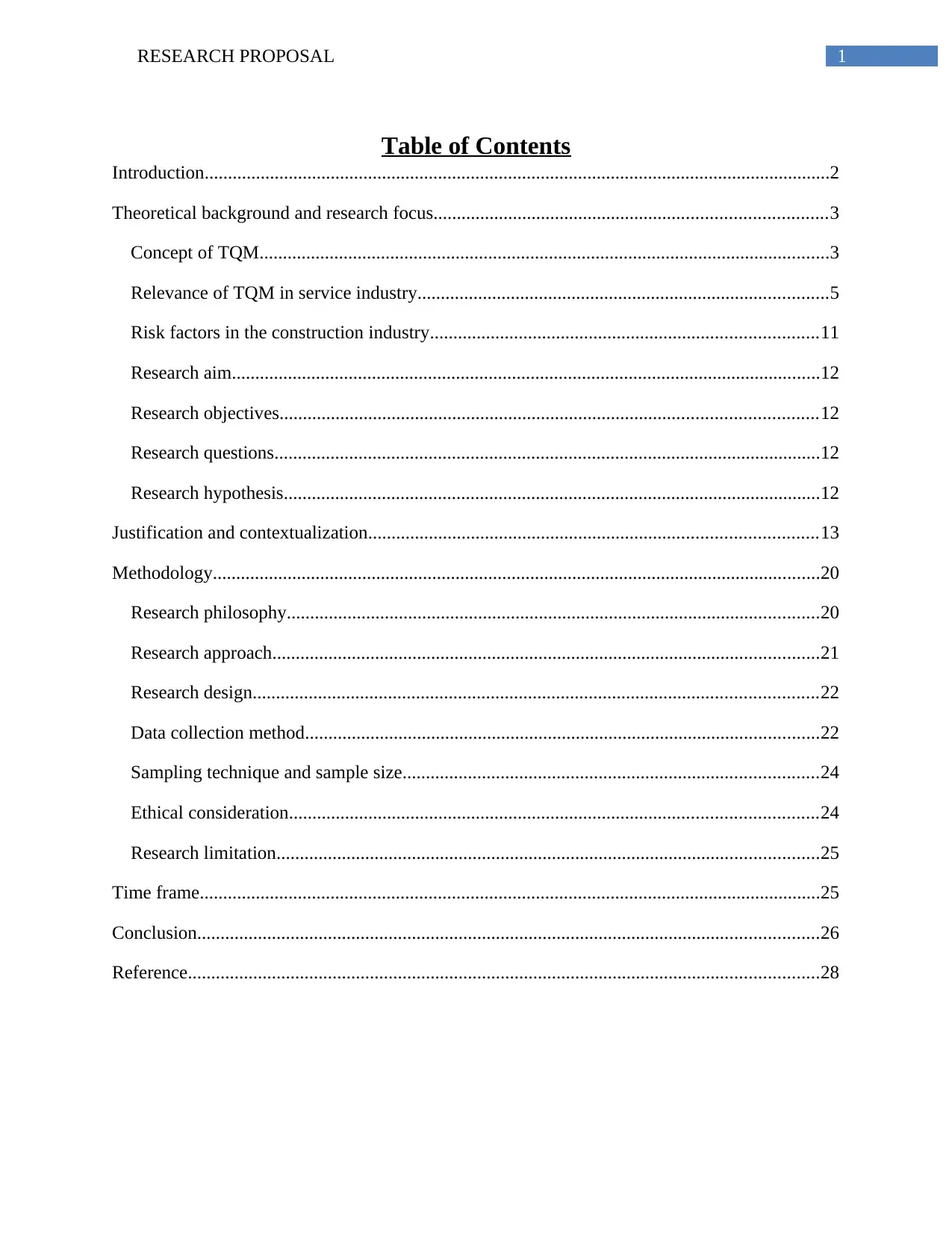
1RESEARCH PROPOSAL
Table of Contents
Introduction......................................................................................................................................2
Theoretical background and research focus....................................................................................3
Concept of TQM..........................................................................................................................3
Relevance of TQM in service industry........................................................................................5
Risk factors in the construction industry...................................................................................11
Research aim..............................................................................................................................12
Research objectives...................................................................................................................12
Research questions.....................................................................................................................12
Research hypothesis...................................................................................................................12
Justification and contextualization................................................................................................13
Methodology..................................................................................................................................20
Research philosophy..................................................................................................................20
Research approach.....................................................................................................................21
Research design.........................................................................................................................22
Data collection method..............................................................................................................22
Sampling technique and sample size.........................................................................................24
Ethical consideration.................................................................................................................24
Research limitation....................................................................................................................25
Time frame.....................................................................................................................................25
Conclusion.....................................................................................................................................26
Reference.......................................................................................................................................28
Table of Contents
Introduction......................................................................................................................................2
Theoretical background and research focus....................................................................................3
Concept of TQM..........................................................................................................................3
Relevance of TQM in service industry........................................................................................5
Risk factors in the construction industry...................................................................................11
Research aim..............................................................................................................................12
Research objectives...................................................................................................................12
Research questions.....................................................................................................................12
Research hypothesis...................................................................................................................12
Justification and contextualization................................................................................................13
Methodology..................................................................................................................................20
Research philosophy..................................................................................................................20
Research approach.....................................................................................................................21
Research design.........................................................................................................................22
Data collection method..............................................................................................................22
Sampling technique and sample size.........................................................................................24
Ethical consideration.................................................................................................................24
Research limitation....................................................................................................................25
Time frame.....................................................................................................................................25
Conclusion.....................................................................................................................................26
Reference.......................................................................................................................................28
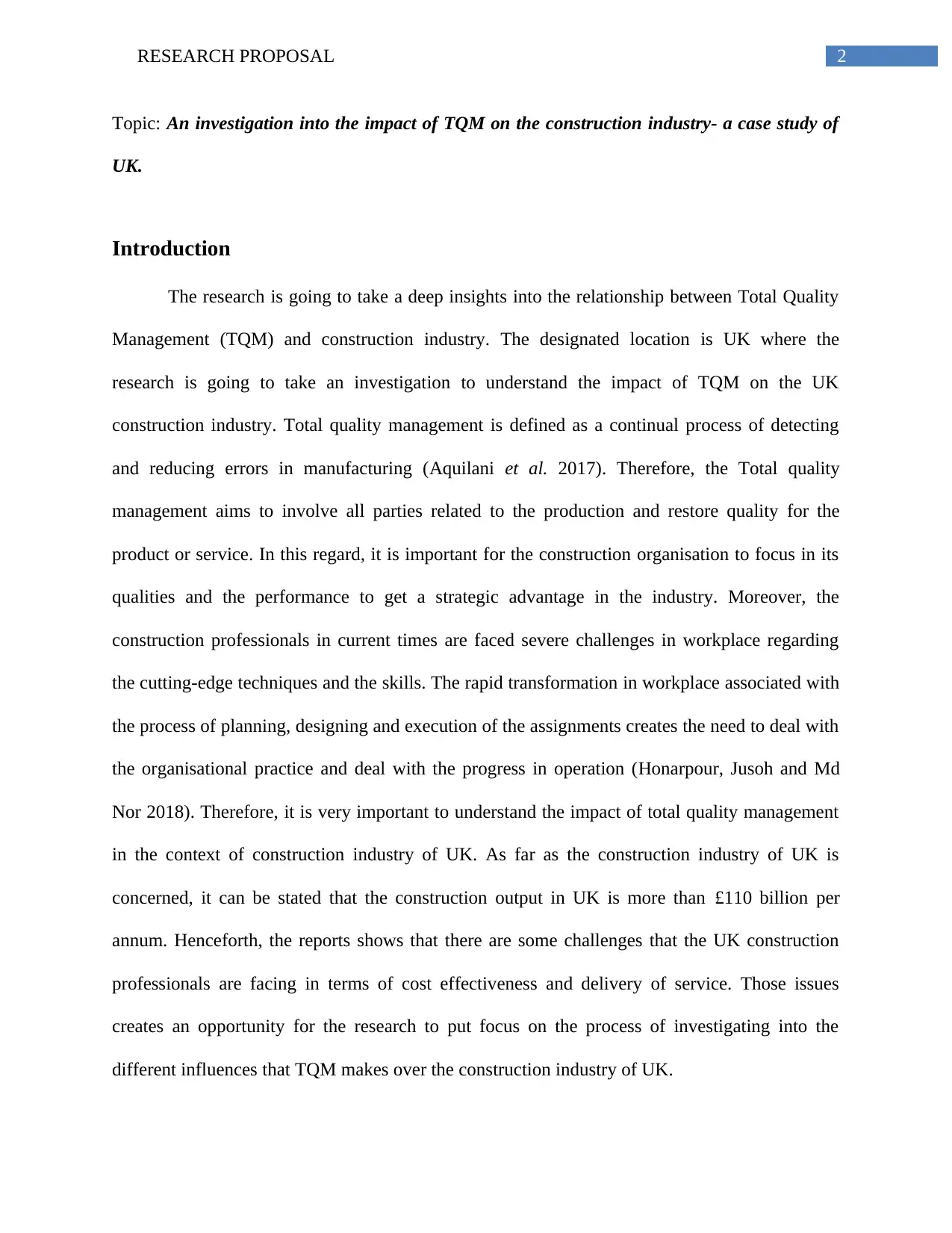
2RESEARCH PROPOSAL
Topic: An investigation into the impact of TQM on the construction industry- a case study of
UK.
Introduction
The research is going to take a deep insights into the relationship between Total Quality
Management (TQM) and construction industry. The designated location is UK where the
research is going to take an investigation to understand the impact of TQM on the UK
construction industry. Total quality management is defined as a continual process of detecting
and reducing errors in manufacturing (Aquilani et al. 2017). Therefore, the Total quality
management aims to involve all parties related to the production and restore quality for the
product or service. In this regard, it is important for the construction organisation to focus in its
qualities and the performance to get a strategic advantage in the industry. Moreover, the
construction professionals in current times are faced severe challenges in workplace regarding
the cutting-edge techniques and the skills. The rapid transformation in workplace associated with
the process of planning, designing and execution of the assignments creates the need to deal with
the organisational practice and deal with the progress in operation (Honarpour, Jusoh and Md
Nor 2018). Therefore, it is very important to understand the impact of total quality management
in the context of construction industry of UK. As far as the construction industry of UK is
concerned, it can be stated that the construction output in UK is more than £110 billion per
annum. Henceforth, the reports shows that there are some challenges that the UK construction
professionals are facing in terms of cost effectiveness and delivery of service. Those issues
creates an opportunity for the research to put focus on the process of investigating into the
different influences that TQM makes over the construction industry of UK.
Topic: An investigation into the impact of TQM on the construction industry- a case study of
UK.
Introduction
The research is going to take a deep insights into the relationship between Total Quality
Management (TQM) and construction industry. The designated location is UK where the
research is going to take an investigation to understand the impact of TQM on the UK
construction industry. Total quality management is defined as a continual process of detecting
and reducing errors in manufacturing (Aquilani et al. 2017). Therefore, the Total quality
management aims to involve all parties related to the production and restore quality for the
product or service. In this regard, it is important for the construction organisation to focus in its
qualities and the performance to get a strategic advantage in the industry. Moreover, the
construction professionals in current times are faced severe challenges in workplace regarding
the cutting-edge techniques and the skills. The rapid transformation in workplace associated with
the process of planning, designing and execution of the assignments creates the need to deal with
the organisational practice and deal with the progress in operation (Honarpour, Jusoh and Md
Nor 2018). Therefore, it is very important to understand the impact of total quality management
in the context of construction industry of UK. As far as the construction industry of UK is
concerned, it can be stated that the construction output in UK is more than £110 billion per
annum. Henceforth, the reports shows that there are some challenges that the UK construction
professionals are facing in terms of cost effectiveness and delivery of service. Those issues
creates an opportunity for the research to put focus on the process of investigating into the
different influences that TQM makes over the construction industry of UK.
⊘ This is a preview!⊘
Do you want full access?
Subscribe today to unlock all pages.

Trusted by 1+ million students worldwide
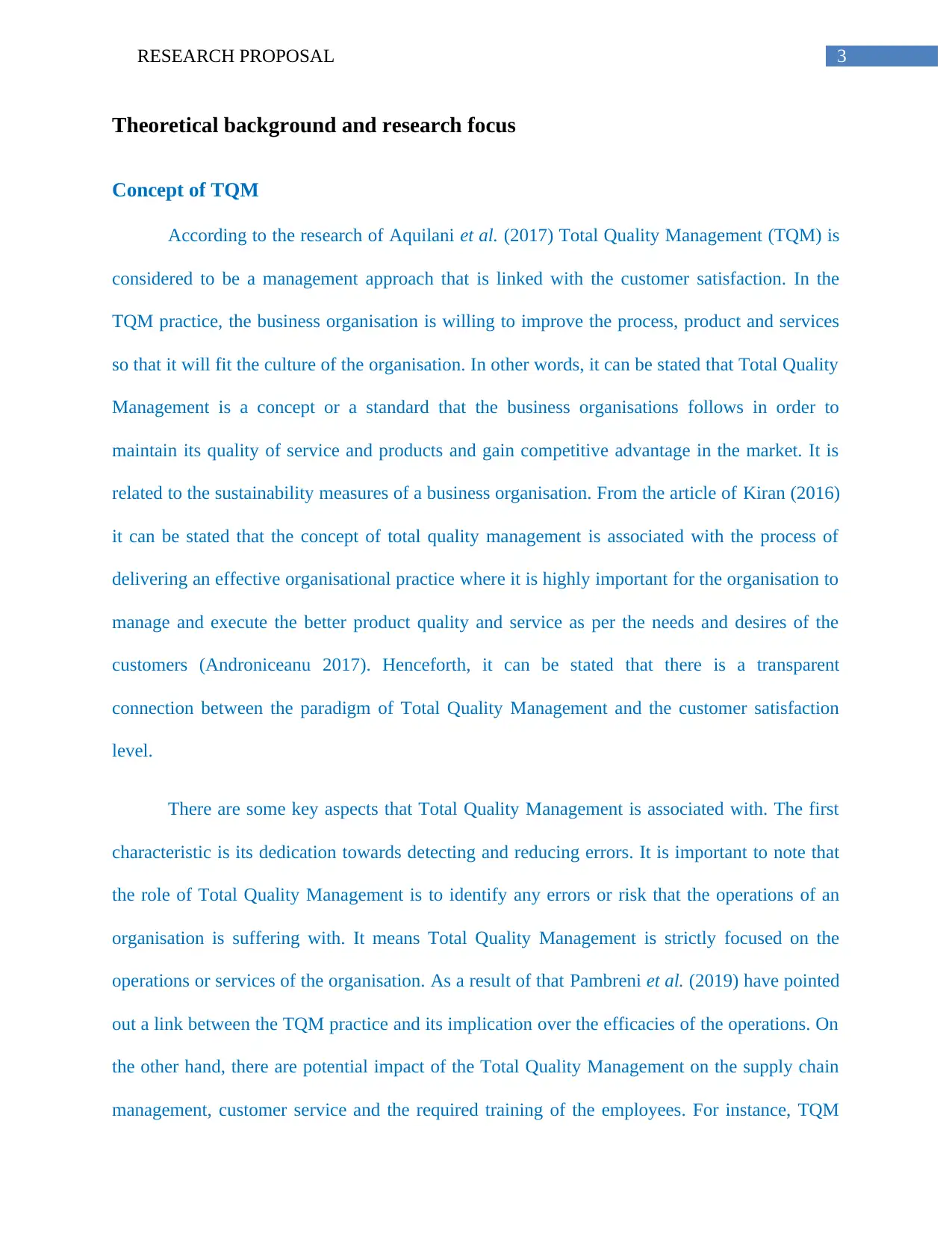
3RESEARCH PROPOSAL
Theoretical background and research focus
Concept of TQM
According to the research of Aquilani et al. (2017) Total Quality Management (TQM) is
considered to be a management approach that is linked with the customer satisfaction. In the
TQM practice, the business organisation is willing to improve the process, product and services
so that it will fit the culture of the organisation. In other words, it can be stated that Total Quality
Management is a concept or a standard that the business organisations follows in order to
maintain its quality of service and products and gain competitive advantage in the market. It is
related to the sustainability measures of a business organisation. From the article of Kiran (2016)
it can be stated that the concept of total quality management is associated with the process of
delivering an effective organisational practice where it is highly important for the organisation to
manage and execute the better product quality and service as per the needs and desires of the
customers (Androniceanu 2017). Henceforth, it can be stated that there is a transparent
connection between the paradigm of Total Quality Management and the customer satisfaction
level.
There are some key aspects that Total Quality Management is associated with. The first
characteristic is its dedication towards detecting and reducing errors. It is important to note that
the role of Total Quality Management is to identify any errors or risk that the operations of an
organisation is suffering with. It means Total Quality Management is strictly focused on the
operations or services of the organisation. As a result of that Pambreni et al. (2019) have pointed
out a link between the TQM practice and its implication over the efficacies of the operations. On
the other hand, there are potential impact of the Total Quality Management on the supply chain
management, customer service and the required training of the employees. For instance, TQM
Theoretical background and research focus
Concept of TQM
According to the research of Aquilani et al. (2017) Total Quality Management (TQM) is
considered to be a management approach that is linked with the customer satisfaction. In the
TQM practice, the business organisation is willing to improve the process, product and services
so that it will fit the culture of the organisation. In other words, it can be stated that Total Quality
Management is a concept or a standard that the business organisations follows in order to
maintain its quality of service and products and gain competitive advantage in the market. It is
related to the sustainability measures of a business organisation. From the article of Kiran (2016)
it can be stated that the concept of total quality management is associated with the process of
delivering an effective organisational practice where it is highly important for the organisation to
manage and execute the better product quality and service as per the needs and desires of the
customers (Androniceanu 2017). Henceforth, it can be stated that there is a transparent
connection between the paradigm of Total Quality Management and the customer satisfaction
level.
There are some key aspects that Total Quality Management is associated with. The first
characteristic is its dedication towards detecting and reducing errors. It is important to note that
the role of Total Quality Management is to identify any errors or risk that the operations of an
organisation is suffering with. It means Total Quality Management is strictly focused on the
operations or services of the organisation. As a result of that Pambreni et al. (2019) have pointed
out a link between the TQM practice and its implication over the efficacies of the operations. On
the other hand, there are potential impact of the Total Quality Management on the supply chain
management, customer service and the required training of the employees. For instance, TQM
Paraphrase This Document
Need a fresh take? Get an instant paraphrase of this document with our AI Paraphraser
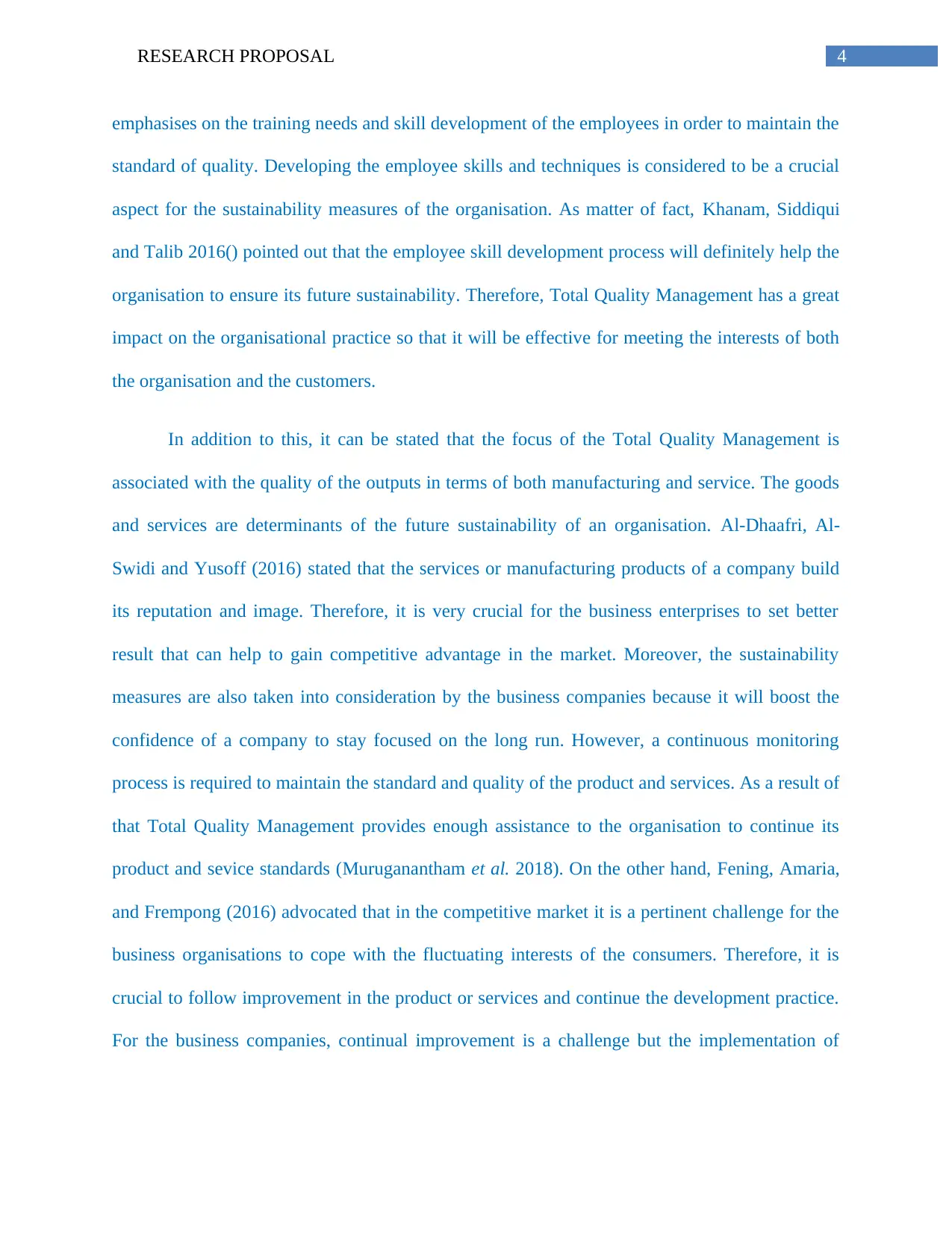
4RESEARCH PROPOSAL
emphasises on the training needs and skill development of the employees in order to maintain the
standard of quality. Developing the employee skills and techniques is considered to be a crucial
aspect for the sustainability measures of the organisation. As matter of fact, Khanam, Siddiqui
and Talib 2016() pointed out that the employee skill development process will definitely help the
organisation to ensure its future sustainability. Therefore, Total Quality Management has a great
impact on the organisational practice so that it will be effective for meeting the interests of both
the organisation and the customers.
In addition to this, it can be stated that the focus of the Total Quality Management is
associated with the quality of the outputs in terms of both manufacturing and service. The goods
and services are determinants of the future sustainability of an organisation. Al-Dhaafri, Al-
Swidi and Yusoff (2016) stated that the services or manufacturing products of a company build
its reputation and image. Therefore, it is very crucial for the business enterprises to set better
result that can help to gain competitive advantage in the market. Moreover, the sustainability
measures are also taken into consideration by the business companies because it will boost the
confidence of a company to stay focused on the long run. However, a continuous monitoring
process is required to maintain the standard and quality of the product and services. As a result of
that Total Quality Management provides enough assistance to the organisation to continue its
product and sevice standards (Muruganantham et al. 2018). On the other hand, Fening, Amaria,
and Frempong (2016) advocated that in the competitive market it is a pertinent challenge for the
business organisations to cope with the fluctuating interests of the consumers. Therefore, it is
crucial to follow improvement in the product or services and continue the development practice.
For the business companies, continual improvement is a challenge but the implementation of
emphasises on the training needs and skill development of the employees in order to maintain the
standard of quality. Developing the employee skills and techniques is considered to be a crucial
aspect for the sustainability measures of the organisation. As matter of fact, Khanam, Siddiqui
and Talib 2016() pointed out that the employee skill development process will definitely help the
organisation to ensure its future sustainability. Therefore, Total Quality Management has a great
impact on the organisational practice so that it will be effective for meeting the interests of both
the organisation and the customers.
In addition to this, it can be stated that the focus of the Total Quality Management is
associated with the quality of the outputs in terms of both manufacturing and service. The goods
and services are determinants of the future sustainability of an organisation. Al-Dhaafri, Al-
Swidi and Yusoff (2016) stated that the services or manufacturing products of a company build
its reputation and image. Therefore, it is very crucial for the business enterprises to set better
result that can help to gain competitive advantage in the market. Moreover, the sustainability
measures are also taken into consideration by the business companies because it will boost the
confidence of a company to stay focused on the long run. However, a continuous monitoring
process is required to maintain the standard and quality of the product and services. As a result of
that Total Quality Management provides enough assistance to the organisation to continue its
product and sevice standards (Muruganantham et al. 2018). On the other hand, Fening, Amaria,
and Frempong (2016) advocated that in the competitive market it is a pertinent challenge for the
business organisations to cope with the fluctuating interests of the consumers. Therefore, it is
crucial to follow improvement in the product or services and continue the development practice.
For the business companies, continual improvement is a challenge but the implementation of
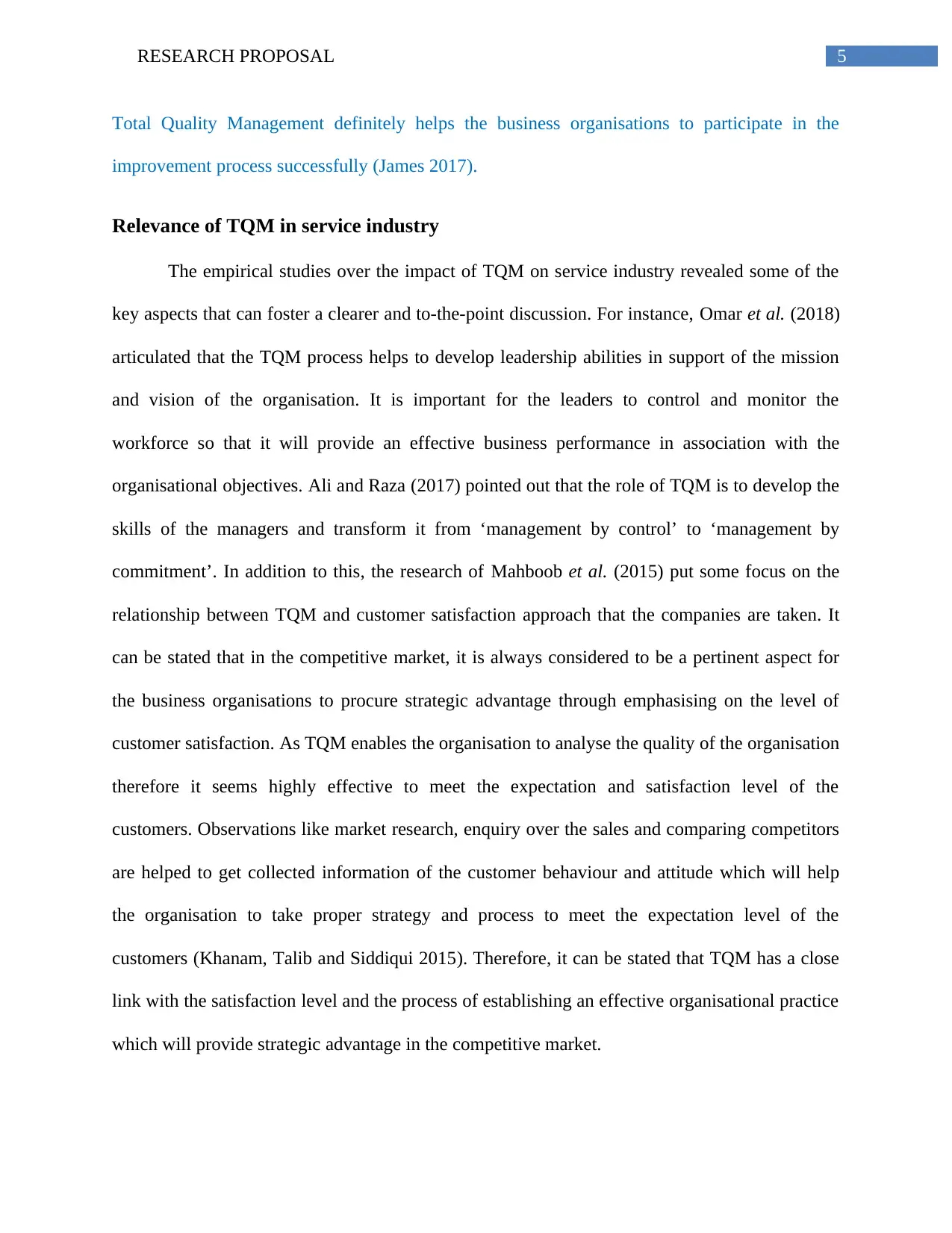
5RESEARCH PROPOSAL
Total Quality Management definitely helps the business organisations to participate in the
improvement process successfully (James 2017).
Relevance of TQM in service industry
The empirical studies over the impact of TQM on service industry revealed some of the
key aspects that can foster a clearer and to-the-point discussion. For instance, Omar et al. (2018)
articulated that the TQM process helps to develop leadership abilities in support of the mission
and vision of the organisation. It is important for the leaders to control and monitor the
workforce so that it will provide an effective business performance in association with the
organisational objectives. Ali and Raza (2017) pointed out that the role of TQM is to develop the
skills of the managers and transform it from ‘management by control’ to ‘management by
commitment’. In addition to this, the research of Mahboob et al. (2015) put some focus on the
relationship between TQM and customer satisfaction approach that the companies are taken. It
can be stated that in the competitive market, it is always considered to be a pertinent aspect for
the business organisations to procure strategic advantage through emphasising on the level of
customer satisfaction. As TQM enables the organisation to analyse the quality of the organisation
therefore it seems highly effective to meet the expectation and satisfaction level of the
customers. Observations like market research, enquiry over the sales and comparing competitors
are helped to get collected information of the customer behaviour and attitude which will help
the organisation to take proper strategy and process to meet the expectation level of the
customers (Khanam, Talib and Siddiqui 2015). Therefore, it can be stated that TQM has a close
link with the satisfaction level and the process of establishing an effective organisational practice
which will provide strategic advantage in the competitive market.
Total Quality Management definitely helps the business organisations to participate in the
improvement process successfully (James 2017).
Relevance of TQM in service industry
The empirical studies over the impact of TQM on service industry revealed some of the
key aspects that can foster a clearer and to-the-point discussion. For instance, Omar et al. (2018)
articulated that the TQM process helps to develop leadership abilities in support of the mission
and vision of the organisation. It is important for the leaders to control and monitor the
workforce so that it will provide an effective business performance in association with the
organisational objectives. Ali and Raza (2017) pointed out that the role of TQM is to develop the
skills of the managers and transform it from ‘management by control’ to ‘management by
commitment’. In addition to this, the research of Mahboob et al. (2015) put some focus on the
relationship between TQM and customer satisfaction approach that the companies are taken. It
can be stated that in the competitive market, it is always considered to be a pertinent aspect for
the business organisations to procure strategic advantage through emphasising on the level of
customer satisfaction. As TQM enables the organisation to analyse the quality of the organisation
therefore it seems highly effective to meet the expectation and satisfaction level of the
customers. Observations like market research, enquiry over the sales and comparing competitors
are helped to get collected information of the customer behaviour and attitude which will help
the organisation to take proper strategy and process to meet the expectation level of the
customers (Khanam, Talib and Siddiqui 2015). Therefore, it can be stated that TQM has a close
link with the satisfaction level and the process of establishing an effective organisational practice
which will provide strategic advantage in the competitive market.
⊘ This is a preview!⊘
Do you want full access?
Subscribe today to unlock all pages.

Trusted by 1+ million students worldwide

6RESEARCH PROPOSAL
Delivery time is also a pertinent aspect in service industry where the reputation and brand
value of the organisation is depended on its efficient delivery practice. According to the research
of Dada, Eniola and Alo (20188) it can be stated that Just-in-time is an approach that represents
delivery of right products at right time and in right place without any error. The technique will
improve the overall productivity of the organisation and identifying the responsibility of the
employees effectively. The TQM practice helps the just-in-time process to prioritise its activities
through training and development of the employees (Hee et al. 2018). As a result of that it is
effective to make a better delivery process and bring success to the organisational development.
Therefore, it is highly effective for the business organisation to enforce total quality management
as the core performance enhancement procedure. As per the research of Androniceanu (2017) it
can be stated that the role of Total Quality Management is to put a great deal of emphasis on the
process orientation. It means the focal point of the Total Quality Management is on the quality,
flexibility and service rather than the cost and technical efficiency. As a result of that the
philosophy of TQM is highly related to the manufacturing and service industries like
construction companies. It can be stated by Fonseca (2015) the TQM practice follows a standard
method so that it will facilitate strategic advantage for the business organisations to put better
impact on their service delivery.
As far as the implementation of total quality management in the construction industry is
concerned, the research of Gómez-Gómez, Martínez-Costa and Martínez-Lorente (2016) found
out that in construction organisation total quality management is an irrelevant phenomena
because it does not fit with the performance measurement and standard of the employees.
Moreover, Calabrese and Corbò (2015) opined that there is an obsession with the bottom line
rather than focusing on the quality of the project. As a matter of fact, focusing more on the
Delivery time is also a pertinent aspect in service industry where the reputation and brand
value of the organisation is depended on its efficient delivery practice. According to the research
of Dada, Eniola and Alo (20188) it can be stated that Just-in-time is an approach that represents
delivery of right products at right time and in right place without any error. The technique will
improve the overall productivity of the organisation and identifying the responsibility of the
employees effectively. The TQM practice helps the just-in-time process to prioritise its activities
through training and development of the employees (Hee et al. 2018). As a result of that it is
effective to make a better delivery process and bring success to the organisational development.
Therefore, it is highly effective for the business organisation to enforce total quality management
as the core performance enhancement procedure. As per the research of Androniceanu (2017) it
can be stated that the role of Total Quality Management is to put a great deal of emphasis on the
process orientation. It means the focal point of the Total Quality Management is on the quality,
flexibility and service rather than the cost and technical efficiency. As a result of that the
philosophy of TQM is highly related to the manufacturing and service industries like
construction companies. It can be stated by Fonseca (2015) the TQM practice follows a standard
method so that it will facilitate strategic advantage for the business organisations to put better
impact on their service delivery.
As far as the implementation of total quality management in the construction industry is
concerned, the research of Gómez-Gómez, Martínez-Costa and Martínez-Lorente (2016) found
out that in construction organisation total quality management is an irrelevant phenomena
because it does not fit with the performance measurement and standard of the employees.
Moreover, Calabrese and Corbò (2015) opined that there is an obsession with the bottom line
rather than focusing on the quality of the project. As a matter of fact, focusing more on the
Paraphrase This Document
Need a fresh take? Get an instant paraphrase of this document with our AI Paraphraser
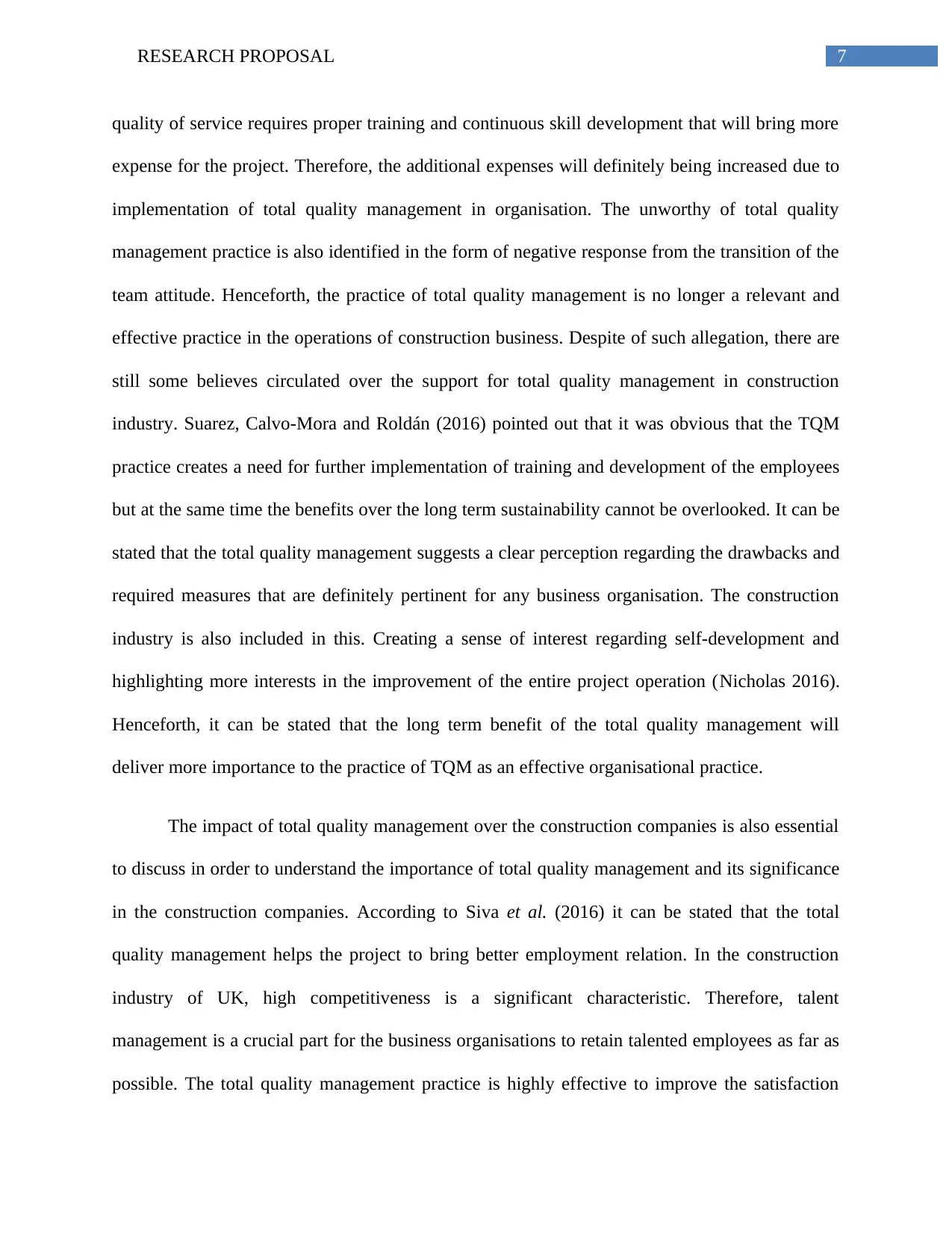
7RESEARCH PROPOSAL
quality of service requires proper training and continuous skill development that will bring more
expense for the project. Therefore, the additional expenses will definitely being increased due to
implementation of total quality management in organisation. The unworthy of total quality
management practice is also identified in the form of negative response from the transition of the
team attitude. Henceforth, the practice of total quality management is no longer a relevant and
effective practice in the operations of construction business. Despite of such allegation, there are
still some believes circulated over the support for total quality management in construction
industry. Suarez, Calvo-Mora and Roldán (2016) pointed out that it was obvious that the TQM
practice creates a need for further implementation of training and development of the employees
but at the same time the benefits over the long term sustainability cannot be overlooked. It can be
stated that the total quality management suggests a clear perception regarding the drawbacks and
required measures that are definitely pertinent for any business organisation. The construction
industry is also included in this. Creating a sense of interest regarding self-development and
highlighting more interests in the improvement of the entire project operation (Nicholas 2016).
Henceforth, it can be stated that the long term benefit of the total quality management will
deliver more importance to the practice of TQM as an effective organisational practice.
The impact of total quality management over the construction companies is also essential
to discuss in order to understand the importance of total quality management and its significance
in the construction companies. According to Siva et al. (2016) it can be stated that the total
quality management helps the project to bring better employment relation. In the construction
industry of UK, high competitiveness is a significant characteristic. Therefore, talent
management is a crucial part for the business organisations to retain talented employees as far as
possible. The total quality management practice is highly effective to improve the satisfaction
quality of service requires proper training and continuous skill development that will bring more
expense for the project. Therefore, the additional expenses will definitely being increased due to
implementation of total quality management in organisation. The unworthy of total quality
management practice is also identified in the form of negative response from the transition of the
team attitude. Henceforth, the practice of total quality management is no longer a relevant and
effective practice in the operations of construction business. Despite of such allegation, there are
still some believes circulated over the support for total quality management in construction
industry. Suarez, Calvo-Mora and Roldán (2016) pointed out that it was obvious that the TQM
practice creates a need for further implementation of training and development of the employees
but at the same time the benefits over the long term sustainability cannot be overlooked. It can be
stated that the total quality management suggests a clear perception regarding the drawbacks and
required measures that are definitely pertinent for any business organisation. The construction
industry is also included in this. Creating a sense of interest regarding self-development and
highlighting more interests in the improvement of the entire project operation (Nicholas 2016).
Henceforth, it can be stated that the long term benefit of the total quality management will
deliver more importance to the practice of TQM as an effective organisational practice.
The impact of total quality management over the construction companies is also essential
to discuss in order to understand the importance of total quality management and its significance
in the construction companies. According to Siva et al. (2016) it can be stated that the total
quality management helps the project to bring better employment relation. In the construction
industry of UK, high competitiveness is a significant characteristic. Therefore, talent
management is a crucial part for the business organisations to retain talented employees as far as
possible. The total quality management practice is highly effective to improve the satisfaction
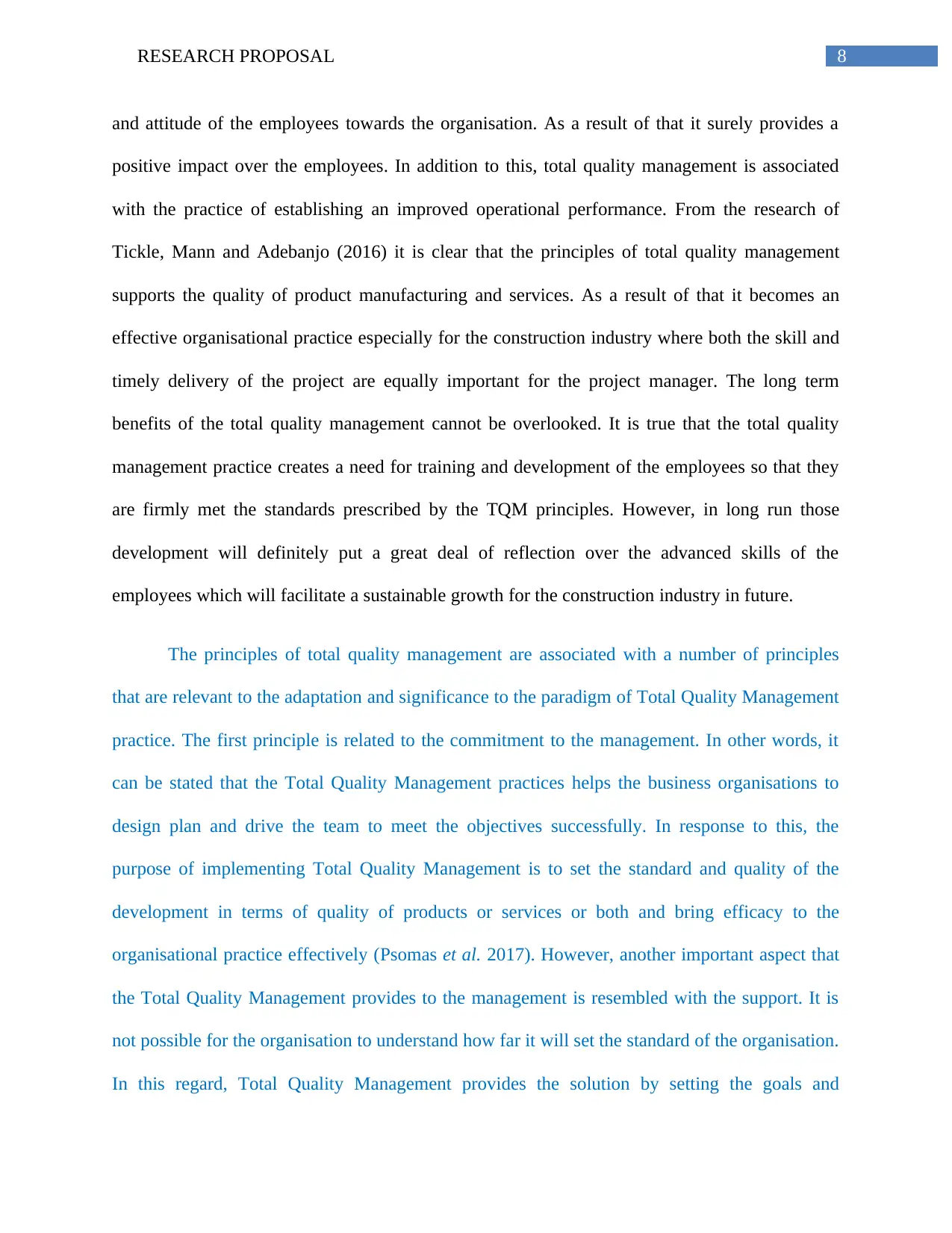
8RESEARCH PROPOSAL
and attitude of the employees towards the organisation. As a result of that it surely provides a
positive impact over the employees. In addition to this, total quality management is associated
with the practice of establishing an improved operational performance. From the research of
Tickle, Mann and Adebanjo (2016) it is clear that the principles of total quality management
supports the quality of product manufacturing and services. As a result of that it becomes an
effective organisational practice especially for the construction industry where both the skill and
timely delivery of the project are equally important for the project manager. The long term
benefits of the total quality management cannot be overlooked. It is true that the total quality
management practice creates a need for training and development of the employees so that they
are firmly met the standards prescribed by the TQM principles. However, in long run those
development will definitely put a great deal of reflection over the advanced skills of the
employees which will facilitate a sustainable growth for the construction industry in future.
The principles of total quality management are associated with a number of principles
that are relevant to the adaptation and significance to the paradigm of Total Quality Management
practice. The first principle is related to the commitment to the management. In other words, it
can be stated that the Total Quality Management practices helps the business organisations to
design plan and drive the team to meet the objectives successfully. In response to this, the
purpose of implementing Total Quality Management is to set the standard and quality of the
development in terms of quality of products or services or both and bring efficacy to the
organisational practice effectively (Psomas et al. 2017). However, another important aspect that
the Total Quality Management provides to the management is resembled with the support. It is
not possible for the organisation to understand how far it will set the standard of the organisation.
In this regard, Total Quality Management provides the solution by setting the goals and
and attitude of the employees towards the organisation. As a result of that it surely provides a
positive impact over the employees. In addition to this, total quality management is associated
with the practice of establishing an improved operational performance. From the research of
Tickle, Mann and Adebanjo (2016) it is clear that the principles of total quality management
supports the quality of product manufacturing and services. As a result of that it becomes an
effective organisational practice especially for the construction industry where both the skill and
timely delivery of the project are equally important for the project manager. The long term
benefits of the total quality management cannot be overlooked. It is true that the total quality
management practice creates a need for training and development of the employees so that they
are firmly met the standards prescribed by the TQM principles. However, in long run those
development will definitely put a great deal of reflection over the advanced skills of the
employees which will facilitate a sustainable growth for the construction industry in future.
The principles of total quality management are associated with a number of principles
that are relevant to the adaptation and significance to the paradigm of Total Quality Management
practice. The first principle is related to the commitment to the management. In other words, it
can be stated that the Total Quality Management practices helps the business organisations to
design plan and drive the team to meet the objectives successfully. In response to this, the
purpose of implementing Total Quality Management is to set the standard and quality of the
development in terms of quality of products or services or both and bring efficacy to the
organisational practice effectively (Psomas et al. 2017). However, another important aspect that
the Total Quality Management provides to the management is resembled with the support. It is
not possible for the organisation to understand how far it will set the standard of the organisation.
In this regard, Total Quality Management provides the solution by setting the goals and
⊘ This is a preview!⊘
Do you want full access?
Subscribe today to unlock all pages.

Trusted by 1+ million students worldwide
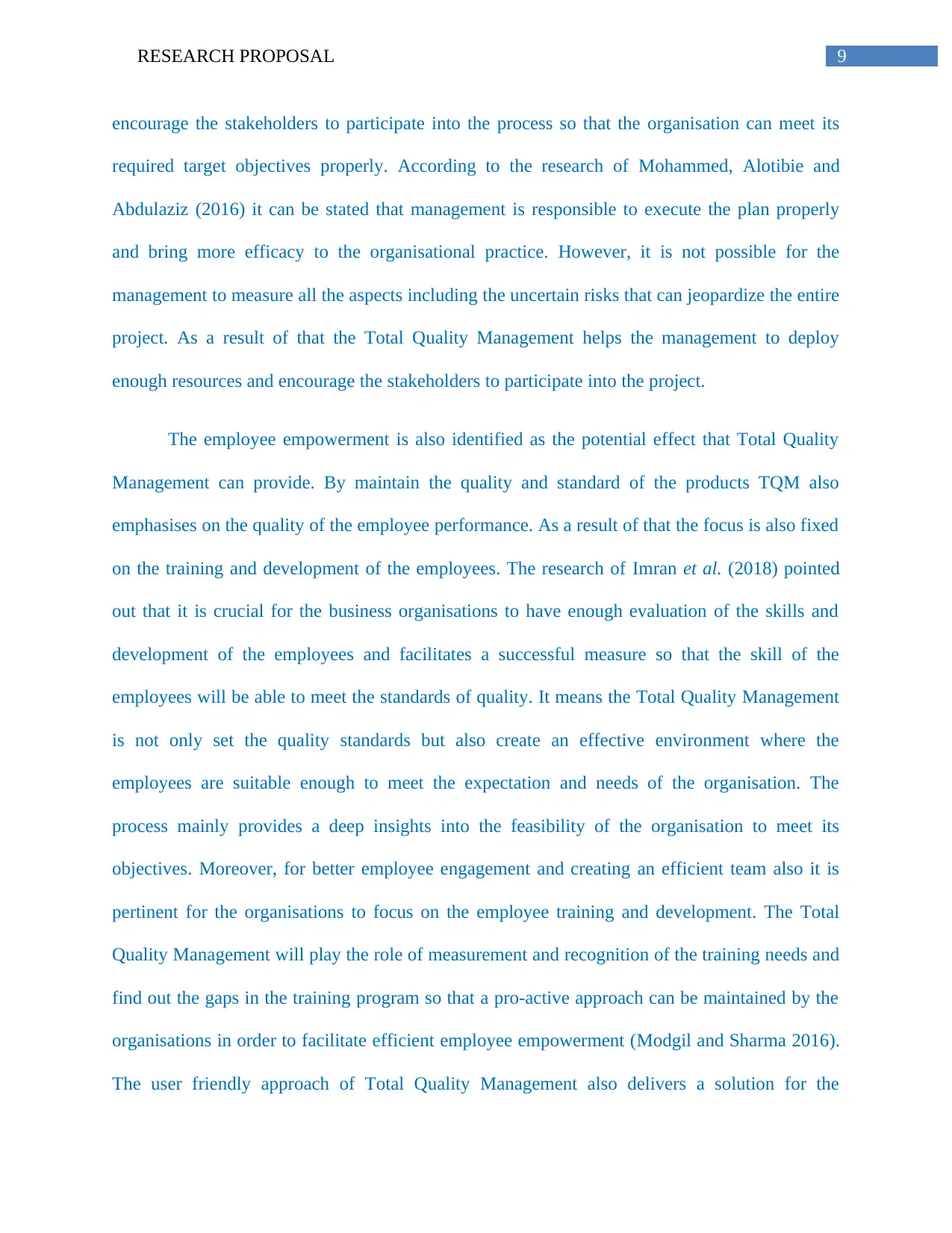
9RESEARCH PROPOSAL
encourage the stakeholders to participate into the process so that the organisation can meet its
required target objectives properly. According to the research of Mohammed, Alotibie and
Abdulaziz (2016) it can be stated that management is responsible to execute the plan properly
and bring more efficacy to the organisational practice. However, it is not possible for the
management to measure all the aspects including the uncertain risks that can jeopardize the entire
project. As a result of that the Total Quality Management helps the management to deploy
enough resources and encourage the stakeholders to participate into the project.
The employee empowerment is also identified as the potential effect that Total Quality
Management can provide. By maintain the quality and standard of the products TQM also
emphasises on the quality of the employee performance. As a result of that the focus is also fixed
on the training and development of the employees. The research of Imran et al. (2018) pointed
out that it is crucial for the business organisations to have enough evaluation of the skills and
development of the employees and facilitates a successful measure so that the skill of the
employees will be able to meet the standards of quality. It means the Total Quality Management
is not only set the quality standards but also create an effective environment where the
employees are suitable enough to meet the expectation and needs of the organisation. The
process mainly provides a deep insights into the feasibility of the organisation to meet its
objectives. Moreover, for better employee engagement and creating an efficient team also it is
pertinent for the organisations to focus on the employee training and development. The Total
Quality Management will play the role of measurement and recognition of the training needs and
find out the gaps in the training program so that a pro-active approach can be maintained by the
organisations in order to facilitate efficient employee empowerment (Modgil and Sharma 2016).
The user friendly approach of Total Quality Management also delivers a solution for the
encourage the stakeholders to participate into the process so that the organisation can meet its
required target objectives properly. According to the research of Mohammed, Alotibie and
Abdulaziz (2016) it can be stated that management is responsible to execute the plan properly
and bring more efficacy to the organisational practice. However, it is not possible for the
management to measure all the aspects including the uncertain risks that can jeopardize the entire
project. As a result of that the Total Quality Management helps the management to deploy
enough resources and encourage the stakeholders to participate into the project.
The employee empowerment is also identified as the potential effect that Total Quality
Management can provide. By maintain the quality and standard of the products TQM also
emphasises on the quality of the employee performance. As a result of that the focus is also fixed
on the training and development of the employees. The research of Imran et al. (2018) pointed
out that it is crucial for the business organisations to have enough evaluation of the skills and
development of the employees and facilitates a successful measure so that the skill of the
employees will be able to meet the standards of quality. It means the Total Quality Management
is not only set the quality standards but also create an effective environment where the
employees are suitable enough to meet the expectation and needs of the organisation. The
process mainly provides a deep insights into the feasibility of the organisation to meet its
objectives. Moreover, for better employee engagement and creating an efficient team also it is
pertinent for the organisations to focus on the employee training and development. The Total
Quality Management will play the role of measurement and recognition of the training needs and
find out the gaps in the training program so that a pro-active approach can be maintained by the
organisations in order to facilitate efficient employee empowerment (Modgil and Sharma 2016).
The user friendly approach of Total Quality Management also delivers a solution for the
Paraphrase This Document
Need a fresh take? Get an instant paraphrase of this document with our AI Paraphraser
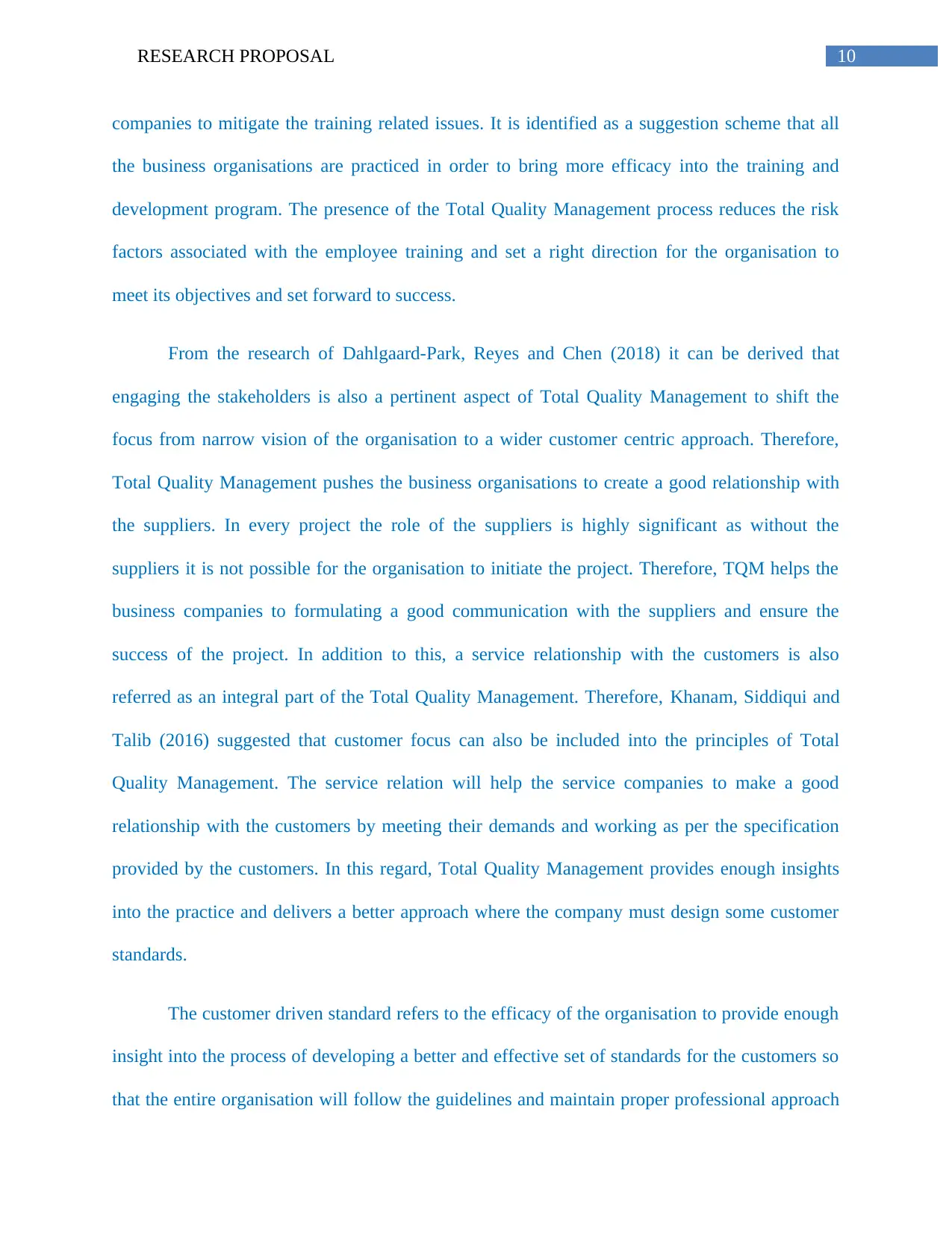
10RESEARCH PROPOSAL
companies to mitigate the training related issues. It is identified as a suggestion scheme that all
the business organisations are practiced in order to bring more efficacy into the training and
development program. The presence of the Total Quality Management process reduces the risk
factors associated with the employee training and set a right direction for the organisation to
meet its objectives and set forward to success.
From the research of Dahlgaard-Park, Reyes and Chen (2018) it can be derived that
engaging the stakeholders is also a pertinent aspect of Total Quality Management to shift the
focus from narrow vision of the organisation to a wider customer centric approach. Therefore,
Total Quality Management pushes the business organisations to create a good relationship with
the suppliers. In every project the role of the suppliers is highly significant as without the
suppliers it is not possible for the organisation to initiate the project. Therefore, TQM helps the
business companies to formulating a good communication with the suppliers and ensure the
success of the project. In addition to this, a service relationship with the customers is also
referred as an integral part of the Total Quality Management. Therefore, Khanam, Siddiqui and
Talib (2016) suggested that customer focus can also be included into the principles of Total
Quality Management. The service relation will help the service companies to make a good
relationship with the customers by meeting their demands and working as per the specification
provided by the customers. In this regard, Total Quality Management provides enough insights
into the practice and delivers a better approach where the company must design some customer
standards.
The customer driven standard refers to the efficacy of the organisation to provide enough
insight into the process of developing a better and effective set of standards for the customers so
that the entire organisation will follow the guidelines and maintain proper professional approach
companies to mitigate the training related issues. It is identified as a suggestion scheme that all
the business organisations are practiced in order to bring more efficacy into the training and
development program. The presence of the Total Quality Management process reduces the risk
factors associated with the employee training and set a right direction for the organisation to
meet its objectives and set forward to success.
From the research of Dahlgaard-Park, Reyes and Chen (2018) it can be derived that
engaging the stakeholders is also a pertinent aspect of Total Quality Management to shift the
focus from narrow vision of the organisation to a wider customer centric approach. Therefore,
Total Quality Management pushes the business organisations to create a good relationship with
the suppliers. In every project the role of the suppliers is highly significant as without the
suppliers it is not possible for the organisation to initiate the project. Therefore, TQM helps the
business companies to formulating a good communication with the suppliers and ensure the
success of the project. In addition to this, a service relationship with the customers is also
referred as an integral part of the Total Quality Management. Therefore, Khanam, Siddiqui and
Talib (2016) suggested that customer focus can also be included into the principles of Total
Quality Management. The service relation will help the service companies to make a good
relationship with the customers by meeting their demands and working as per the specification
provided by the customers. In this regard, Total Quality Management provides enough insights
into the practice and delivers a better approach where the company must design some customer
standards.
The customer driven standard refers to the efficacy of the organisation to provide enough
insight into the process of developing a better and effective set of standards for the customers so
that the entire organisation will follow the guidelines and maintain proper professional approach
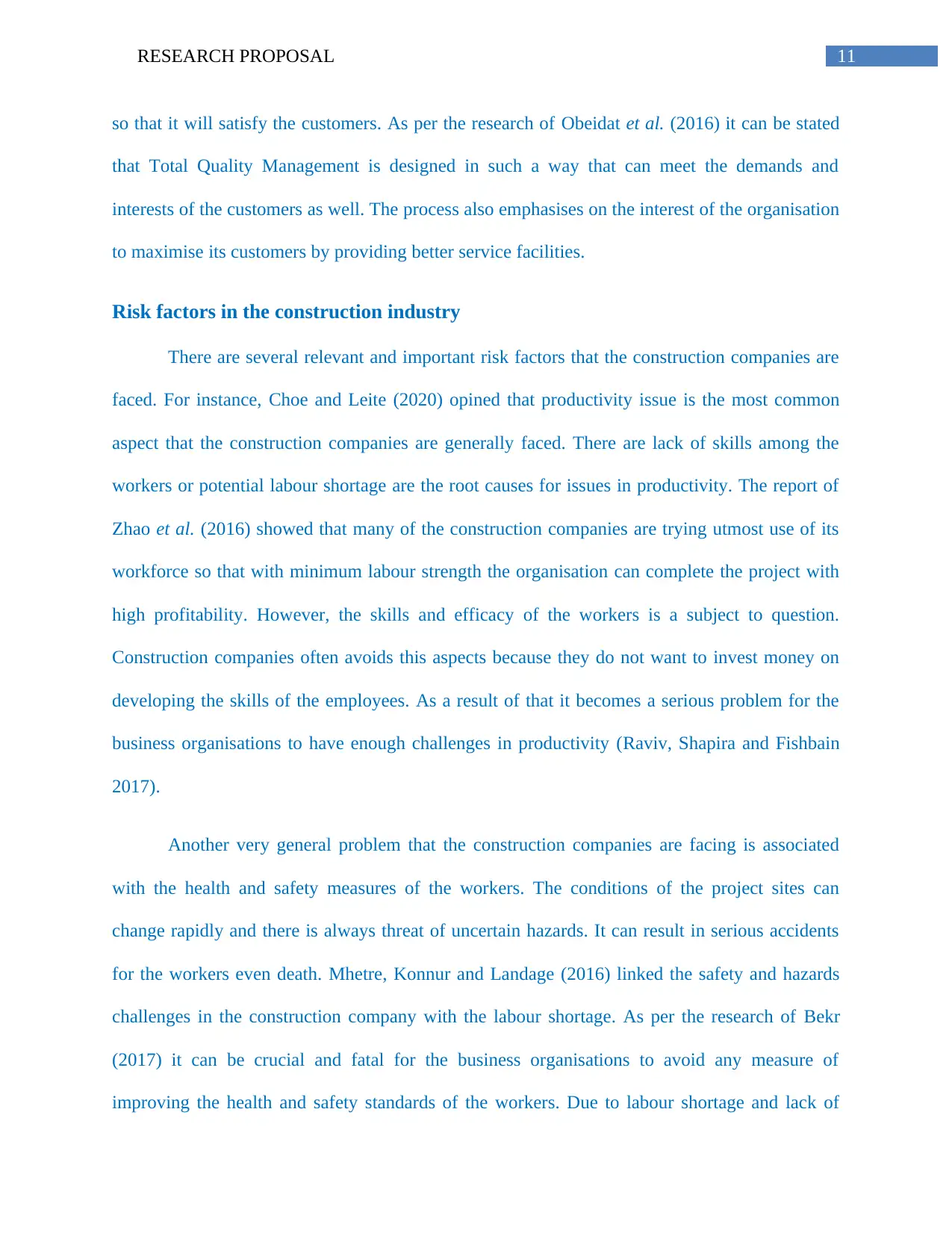
11RESEARCH PROPOSAL
so that it will satisfy the customers. As per the research of Obeidat et al. (2016) it can be stated
that Total Quality Management is designed in such a way that can meet the demands and
interests of the customers as well. The process also emphasises on the interest of the organisation
to maximise its customers by providing better service facilities.
Risk factors in the construction industry
There are several relevant and important risk factors that the construction companies are
faced. For instance, Choe and Leite (2020) opined that productivity issue is the most common
aspect that the construction companies are generally faced. There are lack of skills among the
workers or potential labour shortage are the root causes for issues in productivity. The report of
Zhao et al. (2016) showed that many of the construction companies are trying utmost use of its
workforce so that with minimum labour strength the organisation can complete the project with
high profitability. However, the skills and efficacy of the workers is a subject to question.
Construction companies often avoids this aspects because they do not want to invest money on
developing the skills of the employees. As a result of that it becomes a serious problem for the
business organisations to have enough challenges in productivity (Raviv, Shapira and Fishbain
2017).
Another very general problem that the construction companies are facing is associated
with the health and safety measures of the workers. The conditions of the project sites can
change rapidly and there is always threat of uncertain hazards. It can result in serious accidents
for the workers even death. Mhetre, Konnur and Landage (2016) linked the safety and hazards
challenges in the construction company with the labour shortage. As per the research of Bekr
(2017) it can be crucial and fatal for the business organisations to avoid any measure of
improving the health and safety standards of the workers. Due to labour shortage and lack of
so that it will satisfy the customers. As per the research of Obeidat et al. (2016) it can be stated
that Total Quality Management is designed in such a way that can meet the demands and
interests of the customers as well. The process also emphasises on the interest of the organisation
to maximise its customers by providing better service facilities.
Risk factors in the construction industry
There are several relevant and important risk factors that the construction companies are
faced. For instance, Choe and Leite (2020) opined that productivity issue is the most common
aspect that the construction companies are generally faced. There are lack of skills among the
workers or potential labour shortage are the root causes for issues in productivity. The report of
Zhao et al. (2016) showed that many of the construction companies are trying utmost use of its
workforce so that with minimum labour strength the organisation can complete the project with
high profitability. However, the skills and efficacy of the workers is a subject to question.
Construction companies often avoids this aspects because they do not want to invest money on
developing the skills of the employees. As a result of that it becomes a serious problem for the
business organisations to have enough challenges in productivity (Raviv, Shapira and Fishbain
2017).
Another very general problem that the construction companies are facing is associated
with the health and safety measures of the workers. The conditions of the project sites can
change rapidly and there is always threat of uncertain hazards. It can result in serious accidents
for the workers even death. Mhetre, Konnur and Landage (2016) linked the safety and hazards
challenges in the construction company with the labour shortage. As per the research of Bekr
(2017) it can be crucial and fatal for the business organisations to avoid any measure of
improving the health and safety standards of the workers. Due to labour shortage and lack of
⊘ This is a preview!⊘
Do you want full access?
Subscribe today to unlock all pages.

Trusted by 1+ million students worldwide
1 out of 37
Related Documents
Your All-in-One AI-Powered Toolkit for Academic Success.
+13062052269
info@desklib.com
Available 24*7 on WhatsApp / Email
![[object Object]](/_next/static/media/star-bottom.7253800d.svg)
Unlock your academic potential
Copyright © 2020–2026 A2Z Services. All Rights Reserved. Developed and managed by ZUCOL.





